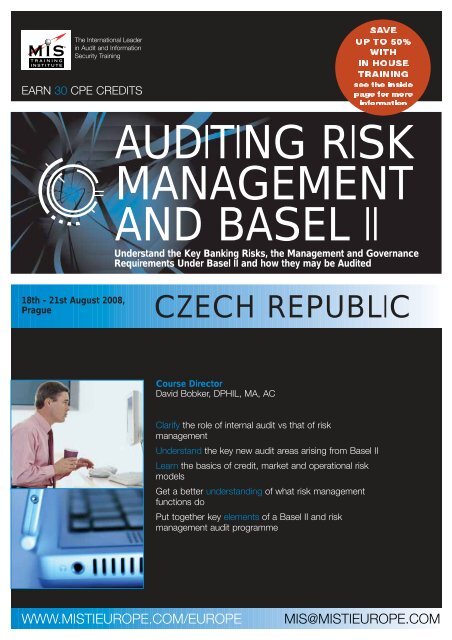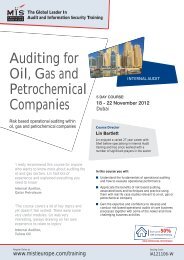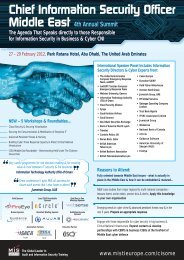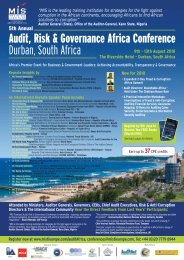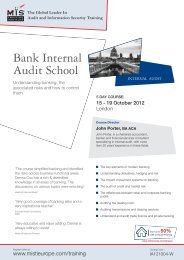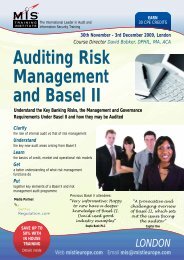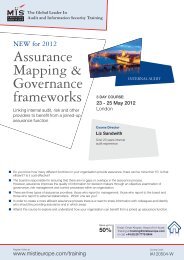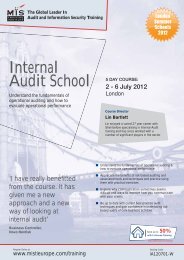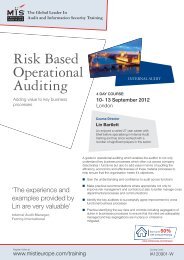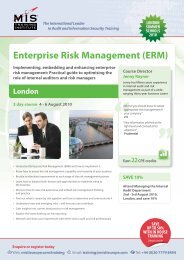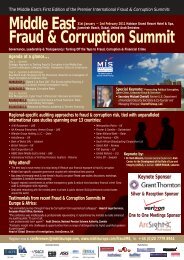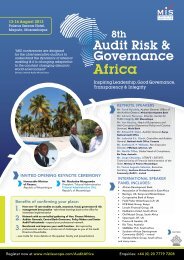AUDITING RISK MANAGEMENT AND BASEL II - MIS Training
AUDITING RISK MANAGEMENT AND BASEL II - MIS Training
AUDITING RISK MANAGEMENT AND BASEL II - MIS Training
You also want an ePaper? Increase the reach of your titles
YUMPU automatically turns print PDFs into web optimized ePapers that Google loves.
The International Leader<br />
in Audit and Information<br />
Security <strong>Training</strong><br />
EARN 30 CPE CREDITS<br />
SAVE<br />
UP TO 50%<br />
WITH<br />
IN HOUSE<br />
TRAINING<br />
see the inside<br />
page for more<br />
information<br />
<strong>AUDITING</strong> <strong>RISK</strong><br />
<strong>MANAGEMENT</strong><br />
<strong>AND</strong> <strong>BASEL</strong> <strong>II</strong><br />
Understand the Key Banking Risks, the Management and Governance<br />
Requirements Under Basel <strong>II</strong> and how they may be Audited<br />
18th - 21st August 2008,<br />
Prague<br />
CZECH REPUBLIC<br />
Course Director<br />
David Bobker, DPHIL, MA, ACA<br />
Clarify the role of internal audit vs that of risk<br />
management<br />
Understand the key new audit areas arising from Basel <strong>II</strong><br />
Learn the basics of credit, market and operational risk<br />
models<br />
Get a better understanding of what risk management<br />
functions do<br />
Put together key elements of a Basel <strong>II</strong> and risk<br />
management audit programme<br />
WWW.<strong>MIS</strong>TIEUROPE.COM/EUROPE<br />
<strong>MIS</strong>@<strong>MIS</strong>TIEUROPE.COM
SEMINAR<br />
FOCUS<br />
<strong>AND</strong><br />
FEATURES<br />
Auditing Risk Management<br />
and Basel <strong>II</strong><br />
18th - 21st August 2008,<br />
Prague<br />
Basel <strong>II</strong> has now been largely implemented in many countries, except for the<br />
approval and implementation of advanced models which will happen mainly<br />
during 2008/2009. Internal audit departments are now busy planning their<br />
first audits in a Basel 2 environment and are finding much has changed from<br />
the traditional approaches.<br />
The first thing is that Basel <strong>II</strong> has brought a significant and explicit focus on<br />
risk management and corporate governance which was more in the<br />
background previously. A major innovation is the requirement for banks to<br />
have an Internal Capital Adequacy Assessment process whereby the board<br />
must, at least annually, self assess the solvency of the bank. This ICAAP is<br />
subject to rigorous review by bank supervisors under Pillar 2 and is required<br />
to be reviewed by internal audit. Secondly, since the advent of Basel I back in<br />
1988, most banks have now set up various types of risk management<br />
function staffed by risk management professionals carrying out a range of<br />
activities. This has put a focus on the role of internal audit in the new world<br />
and whether it is able to carry out its new responsibilities and deliver<br />
expectations.<br />
This four day course focuses on the main banking risks, the management<br />
and governance requirements under Basel <strong>II</strong> and how they may be audited.<br />
The programme is designed to help internal auditors focus on the key areas<br />
where they may need to upgrade their technical knowledge and possibly<br />
engage the services of external specialists so as to ensure they provide the<br />
necessary level of assurance to the board of directors.<br />
COURSE DIRECTOR<br />
DAVID BOBKER DPHIL, MA, ACA<br />
After completing a DPhil in mathematics at Oxford University,<br />
David worked as a manager in a small, diverse, banking and<br />
property company in London. He left the company to train as a<br />
chartered accountant with Peat Marwick Mitchell (KPMG)<br />
specialising in the insurance industry and statistical auditing.<br />
He later moved to Touche Ross, where he provided regulatory<br />
compliance advice mainly to wholesale banks and broker dealers.<br />
In 1989 David was seconded to the Building Societies<br />
Commission as a Supervisor. He had policy responsibility for<br />
capital adequacy which included UK implementation of European<br />
capital adequacy rules and new rules on capital instruments for<br />
building societies. After leaving the Commission he moved into the<br />
internal audit profession at Alliance & Leicester where he was<br />
Head of Group Audit and Group Compliance Officer for 7 years.<br />
In order to provide a more soundly based internal audit service he<br />
developed specialist audit software to ensure fully concise, logical<br />
analysis underpinned all internal audits.<br />
In 1998 he moved to Norwich Union as Head of Group Internal<br />
Audit. His responsibilities during those years included pioneering<br />
work on implementing corporate governance arrangements and<br />
“enterprise risk management”, what became later Turnbull<br />
compliant systems. Involving systems of risk identification and<br />
assessment, effectiveness of controls and compliance processes<br />
together with appropriate corporate reporting systems for the<br />
board and audit committee.<br />
David set up Real Assurance in 2001 helping clients move<br />
towards best practice in quantified risk management systems<br />
(especially for banking industry implementing Basel 2), corporate<br />
governance and compliance.<br />
Prerequisites<br />
Basic understanding of banking activities (wholesale,<br />
commercial and retail lending and treasury operations);<br />
Learning Level<br />
Basic<br />
Fee<br />
GBP £2,195<br />
IN-HOUSE TRAINING<br />
Save up to 50% on training when you run<br />
this course in-house<br />
In-house tailored training will enable you & your colleagues to<br />
make significant savings as we charge per day & not per<br />
participant so the cost remains the same regardless of how<br />
many people attend. We can offer any of our public courses or<br />
tailor them to your requirements. <strong>Training</strong> is available in all areas<br />
of Internal Audit, IT Audit, and IT Security<br />
If you have 6 or more colleagues who would be interested in one<br />
of our courses and you would like to make significant savings,<br />
contact us now;<br />
• What are your training objectives?<br />
• How many people require the training?<br />
• When would you like to run the training?<br />
• What level of experience do you and your colleagues have?<br />
• We will then email you a detailed proposal which addresses<br />
your unique needs.<br />
You will have complete control of the training content and decide<br />
when it is run. We guarantee that we will be able to cater for all<br />
your business needs.<br />
Email Guy Cooper at gcooper@mistieurope.com or call<br />
+44 (0) 20 7779 8975 now<br />
More Great Reasons to Choose our In-house <strong>Training</strong>:<br />
• Save money over public seminar fees<br />
• Save money on travel & accommodation<br />
• Save time on travel as the instructor will travel to you.<br />
Furthermore, the training can be held at the most convenient<br />
time for you.<br />
• Tailor the course content; ensure the relevance of the seminar<br />
for your colleagues. You can tailor the structure & methodology<br />
of your seminar or customise the seminar to meet the<br />
expertise levels of the participants.<br />
• Bring the best in the business; Instructors are hands-on, expert<br />
practitioners who are your subject matter consultants when<br />
they are not training.<br />
• Gain CPE points & certificates for the number of training hours.<br />
EARN 30 CPEs
AGENDA<br />
DAY ONE<br />
Introduction and Course Objectives<br />
Overview<br />
■ Overview of the Basel <strong>II</strong> Accord<br />
■ Centrality of ICAAP<br />
■ Risk management and governance<br />
■ Risk management departments<br />
■ Internal audit and governance<br />
■ How to sort out roles and<br />
responsibilities of interested parties:<br />
■ Internal audit<br />
■ Risk management functions<br />
■ Internal control units<br />
■ Credit review functions<br />
■ Compliance functions<br />
■ Risk and business knowledge and<br />
audit competence<br />
The main banking risks and their<br />
management<br />
■ A typical balance sheet<br />
■ Main banking activities – how banks<br />
make money<br />
■ Credit risk<br />
■ Operational risk<br />
■ Interest rate risk<br />
■ Liquidity risk<br />
■ Business and strategic risk<br />
■ Political risk<br />
■ Market risk<br />
Fundamentals of quantitative analysis<br />
■ The notion of risk<br />
■ Probability distributions<br />
■ Correlation and causality<br />
■ Modelling<br />
■ Value At Risk<br />
■ Analysis of the loss curve<br />
■ Approaches to constructing loss<br />
curves<br />
■ Data collection and statistical models<br />
■ Back testing<br />
■ Risk appetite and economic capital<br />
■ The meaning and importance of<br />
stress testing<br />
DAY TWO<br />
Operational risk management I<br />
■ Types of operational risk<br />
■ Operational risk management<br />
responsibilities<br />
■ Basel <strong>II</strong> requirements<br />
■ Qualitative requirements for TSA<br />
■ Sound practices for the management<br />
of operational risk<br />
■ The role of the operational risk<br />
department<br />
■ Operational risk policy<br />
■ Operational risk reporting<br />
■ The audit of operational risk<br />
management<br />
Case Study: Barings bank<br />
Operational Risk <strong>II</strong> - The AMA<br />
■ The AMA soundness standard<br />
■ The four elements<br />
■ Business environment<br />
■ Internal control evaluation<br />
■ Internal Data<br />
■ External Data<br />
■ Scenario analysis and stress testing<br />
■ Correlation between loss events<br />
■ Problems and issues with AMA<br />
■ Internal audit of the AMA and use of<br />
specialists<br />
Credit Risk Part I<br />
■ Overview of credit risk and credit risk<br />
management<br />
■ Retail unsecured lending – credit<br />
scoring<br />
■ Mortgage lending<br />
■ Corporate lending<br />
■ Public credit ratings – use and<br />
limitations<br />
■ Trade finance<br />
■ Commercial lending – SME sector<br />
■ Collateral and guarantees<br />
■ Counterparty credit risk and<br />
settlement risk<br />
■ Credit derivatives and securitization<br />
■ BIS document - principles for<br />
management of credit risk<br />
■ Credit risk management – roles and<br />
responsibilities<br />
■ Auditing credit risk management<br />
Case Study: Sub-prime crisis 2007<br />
DAY THREE<br />
Credit Risk Part <strong>II</strong> – Modelling and the<br />
Internal Ratings Basis<br />
■ The three elements PD, LGD, EAD<br />
■ PD modeling<br />
■ Logit/probit models<br />
■ The Merton equity model<br />
■ Z-scoring<br />
■ Loan portfolio analysis – Monte Carlo<br />
simulation<br />
■ Economic capital for credit risk<br />
■ The internal ratings basis in Basel <strong>II</strong><br />
■ Pre-conditions for use of IRB<br />
■ Stress testing credit risk – PD<br />
migration, economic modelling<br />
■ Auditing credit risk models – use of<br />
specialists<br />
Structural interest rate risk<br />
■ Interest rate instruments – bonds,<br />
swaps<br />
■ Banking book and trading book<br />
■ Fundamentals of interest rate analysis<br />
– pricing, duration, convexity<br />
■ The spot curve and the yield curve<br />
■ Gap analysis and risk assessment<br />
■ Parallel shifts and twists<br />
■ A simple Monte Carlo model<br />
■ The Basel <strong>II</strong> stress test – 2% parallel<br />
shift<br />
■ More sophisticated “Brownian<br />
motion” models<br />
■ Interest rate risk management – the<br />
ALCO<br />
■ The Basel <strong>II</strong> “Principles” paper<br />
■ Capital assessment under Pillar 2<br />
■ The audit of interest rate risk<br />
management<br />
Case Study: US Savings and Loans<br />
crisis of the 1980’s<br />
Liquidity risk<br />
■ What is liquidity risk<br />
■ Bank runs – Northern Rock<br />
■ Should banks provide capital under<br />
Pillar 2?<br />
■ Cash flow forecasting<br />
■ Scenario analysis and stress testing<br />
■ Mitigation – liquidity, committed<br />
facilities<br />
■ Basel paper on liquidity risk<br />
management<br />
■ Internal audit of liquidity risk<br />
management<br />
Case Study: Northern Rock<br />
DAY FOUR<br />
Capital Assessment Process<br />
■ Pillar 2<br />
■ Basel 2 principles for capital<br />
assessment<br />
■ CEBS guidance<br />
■ Supervisory assessment of capital<br />
■ FSA proforma<br />
■ Stress testing<br />
■ Regulators’ concern with group risk –<br />
contagion risk<br />
■ Auditing the ICAAP<br />
Corporate governance, internal audit<br />
and risk management<br />
■ Corporate governance in banks –<br />
UK, Europe, OECD, Basel<br />
■ Group structures and multi-national<br />
banks<br />
■ Audit Committees and Risk<br />
Committees<br />
■ Risk management a key element of<br />
corporate governance<br />
■ The role of internal audit compared to<br />
the role of risk management<br />
■ The Basel Principles of internal audit<br />
in banks<br />
■ Auditing risk management functions<br />
Market Risk<br />
■ Types of instruments – swaps,<br />
options, forwards, futures<br />
■ Types of market – OTC, “pit”,<br />
electronic<br />
■ Margined transactions<br />
■ Trading and hedging<br />
■ Payoff diagrams<br />
■ Fundamentals of market risk<br />
■ Derivatives, greeks and Black<br />
Scholes<br />
■ Market risk capital and VAR models<br />
■ Simple models<br />
■ Sophisticated models<br />
■ Difference between pricing models<br />
and risk management models<br />
■ Middle office and market risk<br />
governance<br />
■ Scenario analysis and stress testing<br />
■ Auditing market risk management<br />
Case Study: Metallgesellschaft<br />
© <strong>MIS</strong> <strong>Training</strong> 2008
<strong>AUDITING</strong> <strong>RISK</strong> <strong>MANAGEMENT</strong> <strong>AND</strong> <strong>BASEL</strong> <strong>II</strong><br />
Understand the Key Banking Risks, the Management and Governance Requirements Under<br />
Basel <strong>II</strong> and how they may be Audited<br />
30 CPES<br />
Key topic areas:<br />
■ Clarify the role of internal audit vs that<br />
of risk management<br />
■ Understand the key new audit areas<br />
arising from Basel <strong>II</strong><br />
■ Learn the basics of credit, market<br />
and operational risk models<br />
■ Get a better understanding of what<br />
risk management functions do<br />
■ Put together key elements of a Basel<br />
<strong>II</strong> and risk management audit<br />
programme<br />
Why should you attend?<br />
Please quote ref WEB when registering for this course<br />
I would like to receive information about running this course in-house <br />
Auditing Risk Management<br />
and Basel <strong>II</strong><br />
(please photocopy form for additional<br />
delegates)<br />
18th - 21st August 2008, Prague<br />
(MT2448)<br />
£2,195 £<br />
Grand Total £<br />
*Discounts: Please contact <strong>MIS</strong> to find out about<br />
corporate discounts. Discounts can not be used in<br />
conjunction with each other.<br />
FEES MUST BE PAID IN ADVANCE OF<br />
THE EVENT<br />
Customer Information<br />
Title First name Surname<br />
Title/Position<br />
Organisation<br />
E-Mail Address (Required)<br />
Address<br />
Country<br />
Postcode<br />
Telephone<br />
Fax<br />
The information you provide will be safeguarded by the Euromoney Institutional Investor PLC group whose subsidiaries<br />
may use it to keep you informed of relevant products and services. We occasionally allow reputable companies outside<br />
the Euromoney Institutional Investor PLC group to contact you with details of products that may be of interest to you. As<br />
an international group we may transfer your data on a global basis for the purposes indicated above. If you object to<br />
contact by telephone , fax , or email please tick the relevant box. If you do not want us to share your information<br />
with other reputable companies please tick this box .<br />
Payment Information<br />
YOU CAN NOW PAY ONLINE AT www.mistieurope.com<br />
Cheque enclosed (payable to <strong>MIS</strong> <strong>Training</strong>) Please invoice my company PO#<br />
Please debit my credit card AMEX VISA MasterCard<br />
Card Number<br />
Expiry<br />
Cardholders name<br />
Verification Code<br />
Please include billing address if different from address given<br />
Please note that in completing this booking you undertake to adhere to the cancellation and<br />
payment terms listed below<br />
Signature<br />
Approving Manager<br />
5 easy ways to register<br />
Tel: +44 (0)20 7779 8944<br />
Fax completed form to:<br />
+44 (0)20 7779 8293<br />
Email: mis@mistieurope.com<br />
Web: www.mistieurope.com<br />
Post completed form to:<br />
Carlos Doughty,<br />
<strong>MIS</strong> <strong>Training</strong>, Nestor House,<br />
Playhouse Yard,<br />
London<br />
EC4V 5EX UK<br />
Date<br />
Position<br />
Please send me information on:<br />
<br />
<br />
<br />
<br />
■<br />
■<br />
■<br />
■<br />
<strong>MIS</strong> <strong>Training</strong> is the global<br />
leader in internal audit training,<br />
having trained over 200,000<br />
delegates<br />
Course Instructors are the<br />
most reputable in the industry<br />
We have an impressive client<br />
list including AIB, Caja Madrid,<br />
De Nederlandsche Bank, Dexia<br />
Bank, European Central Bank,<br />
& Novartis to name a few<br />
Earn CPE points - which can be<br />
used to qualify for an IRM,<br />
ICAEW, CIMA, ACCA, <strong>II</strong>A or<br />
PRMIA<br />
In House <strong>Training</strong><br />
Auditing Operational Risk,<br />
4th - 5th August 2008, London<br />
Auditing The Credit Department,<br />
6th - 8th August 2008, London<br />
Understanding and Auditing Derivatives,<br />
8th - 11th September 2008, London<br />
Registration Information<br />
(fees must be paid in advance of the<br />
event)<br />
Accommodation<br />
<strong>MIS</strong> <strong>Training</strong> has negotiated special<br />
accommodation rates for hotels in Prague.<br />
For further information please email<br />
mis@mistieurope.com or call + (0) 20 7779<br />
8944. If you have any other queries please visit<br />
www.mistieurope.com/FAQs.<br />
Cancellation Policy<br />
Should a delegate be unable to attend, a<br />
substitute may attend in his or her place.<br />
Cancellations received within 21 working days<br />
of the event are liable for the full seminar fee. If<br />
full payment has been received you are eligible<br />
for a 75% reduction on the next run of the<br />
seminar. This discount will be valid for one<br />
year only. <strong>MIS</strong> reserves the right to change or<br />
cancel programmes due to unforeseen<br />
circumstances.


